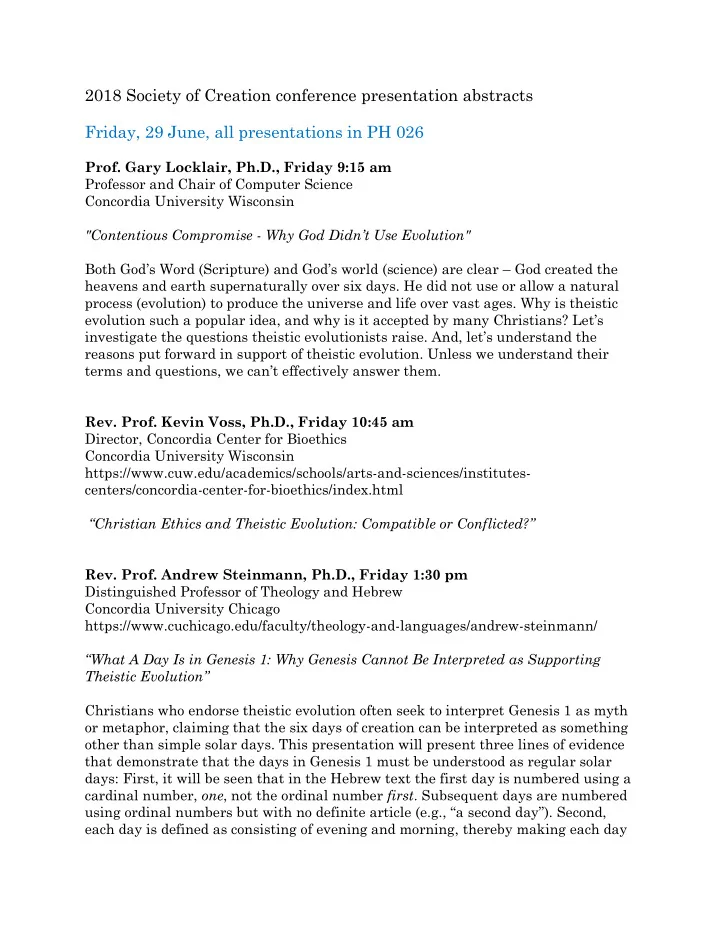

2018 Society of Creation conference presentation abstracts Friday, 29 June, all presentations in PH 026 Prof. Gary Locklair, Ph.D., Friday 9:15 am Professor and Chair of Computer Science Concordia University Wisconsin "Contentious Compromise - Why God Didn’t Use Evolution" Both God’s Word (Scripture) and God’s world (science) are clear – God created the heavens and earth supernaturally over six days. He did not use or allow a natural process (evolution) to produce the universe and life over vast ages. Why is theistic evolution such a popular idea, and why is it accepted by many Christians? Let’s investigate the questions theistic evolutionists raise. And, let’s understand the reasons put forward in support of theistic evolution. Unless we understand their term s and questions, we can’t effectively answer them. Rev. Prof. Kevin Voss, Ph.D., Friday 10:45 am Director, Concordia Center for Bioethics Concordia University Wisconsin https://www.cuw.edu/academics/schools/arts-and-sciences/institutes- centers/concordia-center-for-bioethics/index.html “Christian Ethics and Theistic Evolution: Compatible or Conflicted?” Rev. Prof. Andrew Steinmann, Ph.D., Friday 1:30 pm Distinguished Professor of Theology and Hebrew Concordia University Chicago https://www.cuchicago.edu/faculty/theology-and-languages/andrew-steinmann/ “What A Day Is in Genesis 1: Why Genesis Cannot Be Interpreted as Supporting Theistic Evolution” Christians who endorse theistic evolution often seek to interpret Genesis 1 as myth or metaphor, claiming that the six days of creation can be interpreted as something other than simple solar days. This presentation will present three lines of evidence that demonstrate that the days in Genesis 1 must be understood as regular solar days: First, it will be seen that in the Hebrew text the first day is numbered using a cardinal number, one , not the ordinal number first . Subsequent days are numbered using ordinal numbers but with no definite article (e.g., “a second day”). Second, each day is defined as consisting of evening and morning, thereby making each day
a solar day and anticipating the sabbath command at Exod 20:8 – 20. Third, it will be shown that the refrain at the end of each of the six days in Gen 1 has the form of a historical summary formula similar to other historical summaries in the OT. These three observations nullify any attempts to understand the six days of creation as anything other than regular solar days. Stacy Lung, M.S., Friday 3:15 pm https://www.amazon.com/Wisconsins-Flood-Journey-Creation- Wisconsin/dp/1536844063/ref=sr_1_3?ie=UTF8&qid=1525047237&sr=8- 3&keywords=stacy+lung “What do the ‘experts’ say?” Origins has been presented by evolutionists as an “experts only question.” You are supposed to accept that evolutionary scientists have the answer and you are unqualified to investigate origins yourself. However, we underestimate the ability of basic common sense and intuition to investigate origin claims. Examples from K-12 science experience, such as the scientific method, fossil record, and biochemistry will illustrate the point. Let’s investigate the implication for us as parents, teachers, and church workers in “handing authority over” when it comes to t he origins debate. Saturday, 30 June, all presentations in PH 026 Prof. Gary Locklair, Ph.D., Saturday 9:15 am Professor and Chair of Computer Science Concordia University Wisconsin "Clearly Created – How God Formed Heaven and Earth" Both God’s Word (Scripture) and God’s world (science) are clear – God created the heavens and earth supernaturally over six days. He did not use or allow a natural process (evolution) to produce the universe and life over vast ages. How can we respond to the questions raised by theistic evolution? Once we understand the reasons for believing in theistic evolution, we are in a better position to answer questions and provide a superior model of origins, the creation model. Patrick Winkler, M. Div., M.S. Eng., P.E., Saturday 10:45 am Sr. Mechanical Engineer, Badger Meter, Milwaukee, WI http://www.lutheranscience.org/home/180015283/180015283/180153808/Journal%20 2010-EssentialTools.pdf
“A Lutheran Approach to Creation.” What is it that God’s people really need with respect to creation and evolution issues? What tools do they need in order to help them evaluate things such as creation models and points of evolution from a Lutheran perspective? It is absolutely imperative that Christians begin by making certain fundamental distinctions in order to enable them to assess creationist models and evolutionary viewpoints adequately. Therefore, what is of great help to God’s people is not necessarily providing a new creation model, but rather — and more importantly — providing a way of evaluating such models using certain important distinctions. Valerie Locklair, Dipl. C.A., F.C.A., Saturday 1:30 pm https://smile.amazon.com/Called-Defend-Apologetics-Handbook- Student/dp/1945978651/ref=sr_1_1?ie=UTF8&qid=1525047404&sr=8- 1&keywords=valerie+locklair https://www.1517legacy.com/1517blog?author=5a964a4fec212d0e8e964fc9 “Creed or Compromise: Apologetics in an Age of Uncertainty” What does it mean to live an "apologetical" lifestyle, and what is the relationship between a Christ-centered defense of the faith and six day, literal creation? Are all worldviews created equal, or is there a way to discern which of them - if any - is true? In this presentation, we will examine a conversational approach to apologetics and ways that we can engage challenges to the faith. We will investigate strategies to communicate the truth on a personal level and, in love, point out the dangers of contradictory worldviews in an age of uncertainty. Rev. Prof. Joel Heck, Th.D., Saturday 3:15 pm Professor of Theology Concordia University Texas http://www.concordia.edu/blog/authors/joel-heck.html “Icons of Evolution” If evolution cannot be supported by science, then a compromise position is untenable.
Recommend
More recommend